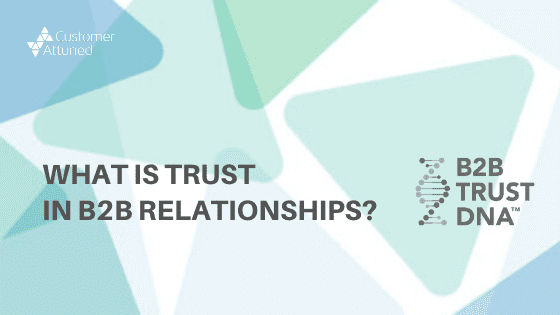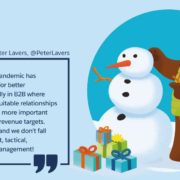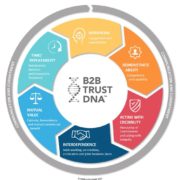What is Trust in B2B Relationships?
What is Trust in B2B relationships? This is a question I have been wrestling with since I enrolled on a Doctoral research programme at the University of Southampton. From years of working in companies and seeing first-hand and experiencing the disastrous effects of trust breaking down, while also experiencing the many benefits of mutually trusting relationships.
How trust operates in B2B relationships
I became curious to know if it was possible to identify the dynamics of trust and unpick them to find a systematic way to embed it. My focus has been to understand how trust operates in B2B relationships.
Over the last four years, I have researched B2B at senior leadership, teams/operations, interpersonal/staff level, across sectors as diverse as: Retail, FMCG, Pharma, Financial services and Outsourced Service Providers.
Is it possible to build trust in B2B relationships?
Yes. It is possible to proactively build in a B2B context and understand how it is defined. It’s subtle dynamics, and, from this point to understand establish both the emotional and rational elements that proactively drive trust across all types of Business to Business relationships.
Trust is a bit like love, liberally used yet not really understood. Why?
Trust unwrapped
Because they are both complex and difficult to define. In my trust sessions, I often ask the audience what they think constitutes trust. The responses are rarely in-correct however, they represent the triggers and/or building blocks of trust. Defining it is a little more tricky and not that obvious.
A clear definition of B2B trust offers a consistent start point of the development of future research, trust understanding and development. It offers a simple to understand explanation of a complex and oft mis-quoted and mis-represented area.
One of the first insights I gained from the doctorate was an understanding of generalised trust, how it’s defined. I think these two definitions (by seminal academics in trust research), capture and define trust on a generalised level.
The willingness of a party to be vulnerable to the actions of another party based on the expectation that the other will perform a particular action important to the ‘trustor’, irrespective of the ability to monitor or control the other party.
Mayer, Davis & Schoorman (1995, p712)
Trust is the willingness to be vulnerable based upon positive expectations about another’s intentions or behaviours.
Rousseau et al (1998)
Showing vulnerability
They both point to a psychological state of making oneself vulnerable to another. This vulnerability is made on the premise that it will be met by benevolence and positive outcomes. This is quite logical. If one side made themselves vulnerable and didn’t meet reciprocity or positive outcomes they are unlikely to do it again. This would be seen as opportunistic behaviour, if the relationship has been going on for some time and then receives an adversarial approach then it would be seen as coercive behaviour.
When researching B2B trust definitions (of which there are circa 46+) two key areas were evidently missing from the academic research undertaken to date.
- Time: the length of time the relationship has been in operation and transacting
- Mutual Value: the mutual benefit both sides receive from the relationship.
This made me to redefine the meaning of B2B trust and the development of a new definition to accurately capture trust in a B2B relational context.
“The willingness to be vulnerable to another party and the decision to engage in actions based upon an interpretation of their ability, credibility and the expectations of mutual value exchange over time” Hollyoake, M (2020)
New academic research has clarified what trust stands for in a B2B relationship.
Trust is about making oneself and / or your organisation more vulnerable, predicated on it leading to positive outcomes in a generalised definition or mutual benefits in a B2B context. If you start to develop positive outcomes or mutual benefit, then you are likely to do it again and trust develops. If you don’t then trust gets eroded and eventually destroyed,
With a clear definition it is possible to start and explore how it could be applied in a B2B relationship, and I will be addressing this in my B2B Trust blog series.
- Excessive Trust – When Trust Goes Wrong - October 29, 2024
- Identification Based Trust - October 21, 2024
- Introducing Knowledge Based Trust - October 15, 2024







